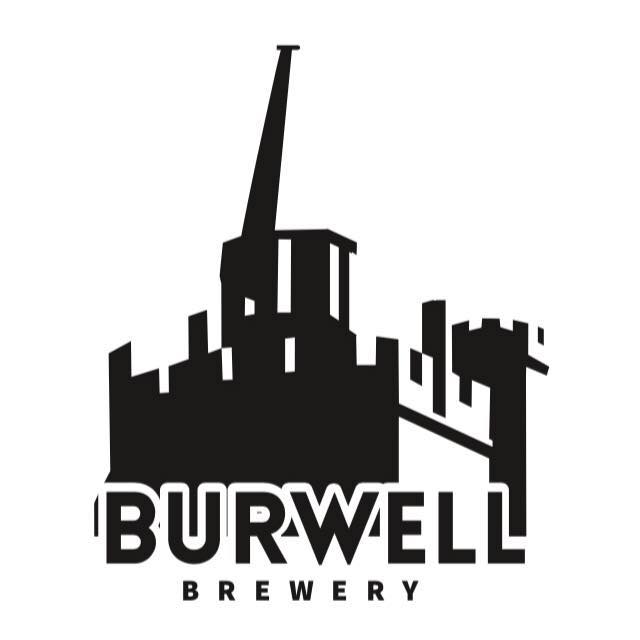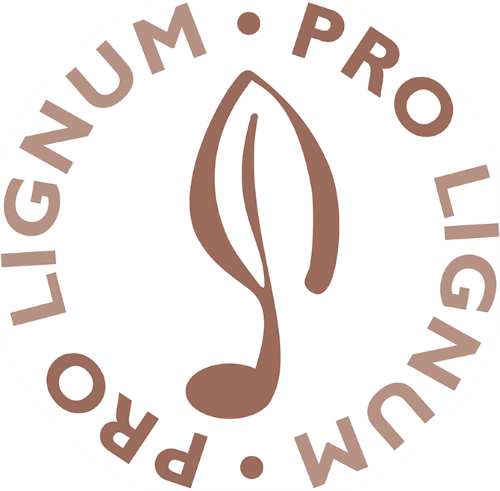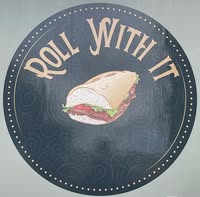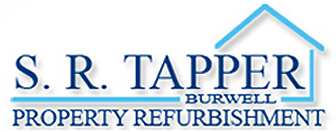Mr Robert Stephenson, Burwell's very first County Councillor
(and father to Marjory)
Obituary
Mr Robert Stephenson, Chairman of the Newmarket Petty Sessions and Deputy Lieutenant of Cambridgeshire, died yesterday, at his home, Manor House, Burwell, at the age of 82. He was chairman of the Cambridgeshire County Council from 1901 to 1904 and of the River Ouse Board in 1924 and 1935. His wife died in 1925, but he is survived by one son and three daughters.'
'Deaths Stephenson. - On Oct. 27, 1929, at the Manor House, Burwell, Cambridge, Robert Stephenson, in his 83rd year. Funeral Thursday, 11.30 a.m. No flowers, by request.' Newspaper Cutting (Newmarket Journal) 2/11/1929: '(Photo. By kind permission of the "Cambridge Chronicle." The Late Mr Robt. Stephenson.) Death of Mr Robert Stephenson. A Splendid Record Of Public Service. It is with profound regret that we record the death of Mr Robert Stephenson, M.A., J.P., D.L., who passed away at his residence, the Manor House, Burwell, on Sunday, in his 83rd year. Despite his advanced age, Mr Stephenson led a very busy and active life practically up to the last. He attended a meeting of the Directors of the Newmarket Gas Company as recently as Friday week. He was ordered to bed by his doctor about a week prior to his death. From that time his strength steadily failed, and he died on Sunday, death being due to heart failure and general debility. No man had played a greater part in the public and business life of the Newmarket district and the county of Cambs. than Mr Stephenson, and certainly no man had rendered greater service to the public. Among the many offices which he held at various times were those of Chairman of the Newmarket Board of Guardians, Chairman of the Assessment Committee of the Newmarket Union, Chairman of the Newmarket (Cambs.) Bench, Chairman of the Cambridgeshire County Council, Chairman of the Newmarket Gas Company for well over half a century, and Chairman of the Ouse Drainage Board. He accepted the latter very onerous and particularly thankless office at an age when most men have sought retirement, and few men could have coped so ably as he did with the almost impossible situation in which the board has found itself. Mr Stephenson was the son of the late Mr Robert Matthew Stephenson, trainer of racehorses, who died in 1870, and was born at Newmarket in 1847. His great-grandfather came to this district from the East Riding of Yorkshire about 140 years ago. Educated at a private school in Bury St. Edmund's, Mr Stephenson subsequently received a very thorough and practical training under one of the leading estate agents in Norfolk; and at the early age of 19, took over a large Crown farm at Burwell in 1866. As time went on he increased the scope of his farming operations, at one time having several farms, extending to about 2,000 acres, under his control. In recent years he had practically relinquished farming, having even given up his North End Farm at Exning; but he had still extensive fruit farms. He took up fruit growing about 35 years ago, and at the time of his death, had in hand about 150 acres of hard fruit lands. He was a successful exhibitor at the Imperial Fruit Show and the local shows, and was a vice-president of the West Cambs. Fruit Growers Association. For many years he also carried on dairy farming upon a large scale. An enterprising and thoroughly up-to-date agriculturist, he was widely recognised as a high authority upon all matters appertaining to agriculture; and for a great number of years, had been regarded as one of the ablest and most expert valuers in the Eastern Counties; while no man in East Anglia, or probably in all England, had a greater knowledge of rating and assessment matters. A number of years ago, Mr Stephenson started the business of Messrs. Robert Stephenson and Son, cement manufacturers, Burwell, and he was the Chairman of the Company up to the time of his death. At the very early age of 24 years, Mr Stephenson became a Director of the Newmarket Gas Company, Ltd., and for the last 52 years he had been its Chairman. In that capacity he contributed very largely to the building up of the particularly sound and prosperous undertaking which the Company now possesses. On the day of the Company's annual meeting in 1926, he was presented with a solid silver inkstand inscribed "Presented to Robert Stephenson, Esq., J.P., D.L., on the completion of 50 years' Chairmanship of the Newmarket Gas Company, 1876 - 1926 - and as a mark of esteem and regard from his co Directors and the Manager." He also received, on the same day, a presentation from the staff. Many years ago Mr Stephenson was Chairman of the Burwell Parish Council of which we believe he was an original member, but his connection with that body had long ceased. He had been a member of the Burwell Fen Drainage Commissioners since 1867, and had for many years been its Chairman. Among the offices which he held at Burwell were those of Chairman of the managers of the Council School, and President of the Burwell Branch of the British Legion. It was largely through his assistance that the Branch was able to secure the spacious and comfortable Club premises which it possesses. Another local organization which owes him a very great debt of gratitude is the Burwell Nursing Association. When it started, Mr Stephenson very generously gave it, as an endowment, a sum of £500 in War Stock, which provided it with an income of £25 per annum; and he has taken a constant interest in the Association ever since. How far back his connection with the Newmarket Board of Guardians went, it is difficult to say; but we know that he was Chairman of the Board from April 1887 to April 1892, a period of five years. After that his attention was very largely given to County Council matters; but he was chosen by the Board of Guardians as one of the two co-opted members whom it was entitled to appoint in 1894, and had been a co-opted member ever since. For a great number of years, up to the time when the Committee ceased to exist, he had been the Chairman of the Assessment Committee of the Newmarket Union, and in the work of that body he found a peculiarly congenial sphere. By his exceptionally wide experience in all matters relating to rating and valuation, by his encyclopaedic knowledge of such matters and by his judicial temperament, he was especially fitted for such an office; and the service which he rendered the public in this capacity, it would be extremely difficult to over estimate. We have never had more convincing proof of his immense knowledge of rating and valuation matters than was given in 1926, when the Jockey Club appealed to the Cambs. Quarter Sessions against the whole of their assessments within the Newmarket Union. In all, the appeals affected properties assessed at something like £9,000 per annum. About £6,000 per annum was being paid upon these properties in rates and had the appeals succeeded, the amount paid by the Jockey Club in rates would have been reduced, roughly by about one third. Though then far beyond "the allotted span," Mr Stephenson threw himself into the fight with characteristic energy and determination. He was largely responsible for the preparation of the Assessment Committee's case; and his own evidence, based upon expert knowledge of properties in the district for two generations, was of immense value to the Committee; while although the witnesses called on one side or the other included most of the principal rating experts in England, Mr Stephenson held his own with the best of them, in his knowledge of rating law and practice and his grasp of the principles of valuation. Mr Stephenson was elected a member of the Cambridgeshire County Council when it was first formed in 1889 and was its first Vice-Chairman. It was mainly owing to his intervention, that at the first meeting of the County Council in January, 1889, a party fight for the 18 Aldermanic Bench was avoided, and an amicable arrangement was come to between the Conservative and Liberal parties. Mr Stephenson himself was one of the seven Liberal Aldermen elected. As vice-chairman, he presided over the County Council with great ability and impartiality on many occasions during the later years of Mr Sperling's chairmanship; and upon Mr Sperling's resignation in 1901 he was unanimously elected as chairman. He held that office until 1904, when he retired on account of ill-health, and proved himself to be one of the ablest of the many able men who have presided over the County Council. During that period he took a very important part in the foundation of the School of Agriculture at Cambridge, and the University recognised his services by conferring upon him the degree of Master of Arts, honoris causa. He also did much for technical education in the county, and devoted a sum of £100 presented to him upon his retirement from the chairmanship of the County Council, towards the foundation of the library at the County Boys' School, in which he took a keen interest. In recognition of this, the library was named the Stephenson Library. The deceased gentleman had been a Justice of the Peace for Cambs. since 1892, and for a number of years had been chairman of the Newmarket Petty Sessions. As a magistrate he was inflexibly just in all his decisions. Up to the time of his death, he was one of the representatives of Quarter Sessions on the Cambs. Standing Joint Committee; and he had also the honour of being a Deputy Lieutenant of the county. Reference has already been made to Mr Stephenson's interest in education. It should be stated that he was elected as chairman of the Cambs. Education Committee at the first meeting of that body in 1903. As chairman of the Cambs. County Council, he attended the Coronation of the late King Edward VII.; and on the occasion of His Majesty's visit to Cambridge in 1904 presented him with an address on behalf of the County Council. After giving up the tenancy of the Crown Farms at Burwell, Mr Stephenson moved to the Manor House in 1904. All his life a very busy man, he found little time for recreation; change of work was his usual form of rest, but he occasionally indulged in a day's shooting, and he was always a lover of horses. Until quite recently he might frequently be seen on horseback; and although in the last few years he occasionally made use of a motor car, he had no love for mechanised locomotion. Since a sudden illness, which attacked him when in Cambridge some years ago, he had not been so strong as he was previously. A little over a year ago he underwent a rather serious operation, but made an excellent recovery, and had since partially resumed his former activities. Though he sat on the Cambs. County Council as a Liberal, Mr Stephenson was never a strong party man. In recent years he had on selected occasions spoken at public meetings in support of Conservative candidates. Mr Stephenson married, in 1868, Miss Sarah Rogers, a daughter of Mr Sam Rogers, who was one of the leading jockeys and trainers of his generation. She died in 1925; and a family of one son and three daughters survive him.'
'An Appreciation. (By A Fellow Worker.) It is difficult to realise the many and varied parts a man may play during a long life usefully and devotedly spent in the service of the public, or the value of services such an one has rendered to the community amongst whom he lived and had his being, but all who knew Robert Stephenson will agree that he sought, endeavoured and succeeded in performing everything he put his hand to with a zeal which commanded the admiration of his fellows, whether they agreed with him or not. He was a Newmarket man, the son of Robert Matthew Stephenson, who was a trainer and built Fitzroy House. Young Bob (as he was familiarly called) could tell of many historical events and episodes of the habitués who frequented Newmarket during his boyhood days 70 years ago. His father gave him a generous education, and the subject of these lines early showed that he was endowed with ability above the average, for in his early manhood, at the age of 19, he was farming at Burwell, in the "sixties." He was a director of the Newmarket Gas Company in 1870, and in May, 1876, he became the company's chairman, and occupied the position until the day of his death, being regularly re-elected for the long period of 54 years, which surely must be a record for a gas company's chairman. Under his able guidance the company has achieved its success, for it has grown from an annual output of about six million cubic feet to 66 millions output during the time he was connected with the undertaking. On his completion of fifty years' chairmanship his colleagues marked the occasion by presenting him with a silver Georgian inkstand. His chief energies were, however, devoted to agriculture at Burwell, where he acquired several large farms. His orchards and asparagus beds became famous, for his knowledge of agriculture proved him to be one of the most up-to-date farmers and fruit growers in East Anglia; his advice being equally sought by Government officials and departments, and by the humblest small holder. For many years he was agent to the Crown, and as a land valuer his valuations could always be relied upon, for Robert Stephenson's judgment on the transfer of land and farms was thorough, impartial, just, and fair. Many years ago he built and conducted a large cement works, which provided work for the surplus labour of Burwell, Fordham and Newmarket, with varying success, and it was a source of keen disappointment to him when his work people had to stand by when from time to time the works were temporarily closed down due to trade depression. But it was by his work for the public weal that he will be best and long remembered. He was a County Councillor and Chairman of the Cambridgeshire County Council for some years, and during which he did yeoman service for the cause of education, and it came as a great blow to the county when owing to a breakdown in health he had to give up the work to which he had devoted much of his time and burnt a great deal of midnight oil in performing with great satisfaction to his constituents and colleagues. The university acknowledged his services to education by conferring upon him the honorary degree of M.A. During the Great War his services in many ways were freely given for the country's welfare, and in this respect he again over taxed his strength, and had to rest a while on his doctor's orders; this he told the writer was the hardest work he ever had to perform, but he resumed his activities at the earliest possible moment. He never spared himself when duty called. Once during the war, when en route to a conference with Lord Kitchener, he was inspecting trench excavations in South Essex, when he was arrested as a spy, and on stating he was going to the War Office to an interview with Lord Kitchener, the over zealous military officer retorted, "Aye, we have heard that tale before." It was not until the good offices of the Chief Constable of Cambridge were requisitioned that he was released, too late for his appointment, but another was made. For several years he was Chairman of the Newmarket Board of Guardians, and during that time great and important additions were made to the infirmary of the institution, a ward being given the name of Stephenson, and as Chairman of the Assessment Committee until its duties were transferred to another authority, he brought to bear the profound knowledge of rating, tithes, agricultural land, sporting rights, etc., which together with his ripe experience enabled the Assessment Committee to arrive at amicable and fair decisions, often of a complex and intricate character. The strict impartiality with which he held the scales of Justice was rarely questioned, but if it was nothing by way of evidence and research was too small or too great to be thoroughly sifted in order to arrive at a fair and just verdict. In a recent case referred to Quarter Sessions the prodigious work he put in to have the case fully, fairly, and completely put before the Court, astonished not only the appellants but the counsel and experts engaged alike, and he received congratulations and thanks from the Board of Guardians. As a Justice of the Peace he was the senior member of the Newmarket (Cambs.) Bench, and when it was his turn by rota to take the chair, nothing but illness kept him away. As Chairman of the Ouse Drainage Board he had worked assiduously for some years to get that piece of vexed and complex machinery into working order, a task which will now have to be undertaken by others. He was a sportsman, too, though he did not follow the sport of kings as his forbears had done. Still, on a big race day he was frequently to be seen on the Heath astride a sturdy hack, watching the races, and at one time he was a successful breeder of the thoroughbred. In the shooting season it was a great delight to him to entertain his friends and neighbours to a partridge shoot on his extensive farms, and when he was well over three score years and ten, he could and did walk many a younger man completely down. None will deny that East Anglia, and especially East Cambridgeshire, has lost a champion advocate for all that came within his purview for the good and welfare of the community, which is the poorer now that he has gone to his well-earned rest. It can be truly said of him that Justice was the guide of all his actions. He abhorred shams and had no use for ostentation. His riches consisted in the fewness of his wants. He lived accordingly, and died in harness, as he would have wished, leaving behind an example of work well done. Every institution he has worked for, whether county, parochial, company, education, agriculture, or business, which has benefited by his guidance and wise counsel, will agree that he rendered a faithful account of his stewardship, and has left a gap in our public life which it will be hard to fill. Work, he considered the greatest game in the world, and this inspiration he has left for those who come after him to follow.'
'Funeral of Mr R. Stephenson at Burwell. Many Public Bodies Represented. Amid general indications of respect and sorrow, all that was mortal of the late Mr Robert Stephenson, M.A., J.P., D.L., was laid to rest in the churchyard at Burwell, close to the Manor House where he had resided for the last 25 years, yesterday (Thursday) at 11.30 a.m. The body had been taken to the church on Wednesday, the bearers being four old employees, Messrs. A. Docking, L. Southgate, A. Talbot and R. Attmore. It was enclosed in a coffin of plain oak, with brass fittings, the inscription on the breastplate being: - "Robert Stephenson Born March 25th, 1847, Died October 27th, 1929." The service in the church was plain and simple, and was conducted by the Rev. A.G. Walpole Sayer (vicar of Burwell), who also officiated at the graveside. At the conclusion of the service in the church, Mr H.R.H. Baker, who presided at the organ, played a funeral march. The principal mourners present were Mr Robert Stephenson (only son), Miss A.M. Stephenson, Miss E. Stephenson and Miss M. Stephenson (daughters), Mr Parke Stephenson (grandson), Mrs Parke Stephenson, Mr J. Fitch, of Clacton-on-Sea (brother-in-law); Mr R. Fitch, of Manningtree (nephew); Mr S.L. Rogers, of Williton, Somerset (brother-in-law); the Rev. and Mrs W.J. Wickins, of Great Shelford (brother-in-law and sister-in-law); Mrs Tom Waugh and Miss Hayhoe, of Newmarket (nieces); Mr Frank Wellsman (cousin) and Mrs Wellsman, of Newmarket. About 100 employees at Mr Stephenson's fruit farms, cement works, etc., attended. Among them were Mr J.G. Faircliffe (agent and farm manager), Messrs. G. Crack and Arthur Hancock (two of the principal foremen - a third was absent through illness), Mr Peter Male (engineer at the coal store), Mr W.E. Blagbrough (manager for Messrs. R. Stephenson and Son, Ltd., at the Burwell Cement Works), and the Cement Works Staff, including Mr H.T. Withers (accountant), Mr E.J. Andrews (chemist), and Mr A. Topper (works foreman). Four old employees bore the body from the Church to its last resting place - Messrs. John Webb, Arthur Sammons, Joshua Badcock and A. Hancock. There was a very large and representative attendance, the spacious Church being crowded; and many were unable to attend in consequence of it being the busy race week at Newmarket. Mr S.R. Ginn, late Clerk to the County Council, represented the Lord Lieutenant of Cambs., Mr C.R.W. Adeane. The Newmarket Gas Company, Ltd., of which Mr Stephenson was Chairman for 53 years, was represented by Mr C.B. Bosworth and Mr J.L. Jarvis, Directors, and Mr J.H. Troughton, J.P. (Manager and Secretary). Representatives of the Newmarket Board of Guardians included Messrs. James Wheeler (Newmarket), Chairman, Harry Peachey (Burwell), Vice-Chairman, G.F. Townsend (Fordham), Chairman of the Newmarket Rural District Council, Ed. Leonard (Soham), vice-chairman of Rural District Council, F.N. Bocock (Cropley Grove), ex-Chairman of the Board of Guardians, A.R. Catchpole (Lidgate), R.L. Fuller (Wicken), Seth Collen (Fordham), Thos. Webb (Lode), Basil J. Slack (Chippenham), Mrs R.S. Ruston (Exning), the Rev. Stanley Austin (Woodditton), and Capt. C.C. Oakey (Westley), with Major Sidney J. Ennion (Clerk). The Burwell Parish Council was officially represented by Messrs. T.H. Brown (Chairman) and G.N. Blackwell (ex-Chairman), and the Managers of the Burwell Council School by Messrs. H.W. Game and G.R. Hills. Representatives of the Cambs. County Council included Alderman W.C. Jackson (Chairman), Alderman J. Frohock (Cambridge), Alderman Major S.G. Howard, Councillor George Webb (Burwell), Councillor W.J. Taylor (Newmarket), Dr. Robinson (County Medical Officer), Mr H.H. Dunn (County Architect), and Mr Ashley Tabrum (Clerk to the County Council). The Ouse Drainage Board was represented by Messrs. W. Hutson (Vice-Chairman), W. Sandifer, Preston, Parsons, Tebbutt, and Godfrey, Mr A. Bebbington (Clerk), Capt. Matthews (Engineer), and Mr D.J. Paul (Assistant Engineer). Colleagues on the Newmarket (Cambs.) Bench who were present included Mr S.A. Taylor, Mrs R.J. Robins (Isleham), Mr W. Flatt (Fordham), Major S.G. Howard (Upend), Mr E.W. Diver (Isleham), Mr C.E. Hammond (Newmarket), and Mr Roger Clark (Soham), with Mr Percy Cooper, solicitor, of Newmarket (Clerk to the Justices). Among many others present were Mr W. Varney Webb, Chief Constable of Cambs., Dr. Voelcker, consulting chemist to the Royal Agricultural Society of England, the Rev. W.G. Dodd (rector of Ashley), the Rev. Lawrence Fisher (vicar of Swaffham Bulbeck), Dr. Charles Lucas and Mr Alfred Danby (churchwardens of Burwell), the Rev. E.T. Bradley (Burwell), W. Boggis (Carlton Grange), W.A. Slack, Arthur Bland, and J.B. Westley (Soham), Dr. and Mrs Eric Ennion (Burwell), Mrs O.R. Ennion, Dr. Gilbert (Bottisham), Mr R.S. Ruston (Newmarket), Miss Ruston (Burwell), Mr F.T. Glendon (Headmaster), and Miss Wilderspin, representing the staff of the Burwell Senior Council School; Mr E. Mellish Clark (local director of Barclay's Bank and chairman of the Cambs. War Pensions Committee), Mr H.R. Buck (manager, Barclay's Bank, Newmarket), Mr J. Winship, Mr S.W. Tebbitt, of Soham representing Mr R. Tebbitt), Mrs Sayer (Burwell Vicarage), Mr and Mrs H.R. Baker (Burwell), Mr T. Musgrave Francis, of Quy Hall (late chairman of Cambs. Quarter Sessions), Mr F. Eustace Ball (for many years agent to the Burwell Fen Drainage Commissioners), and Mr Noel Ball; Mr R.J. Robins and Mr Roger Robins (Isleham), Mr B.H. Jones (Cambridge), Mr Arthur Elmer (representing Messrs. Charles Townsend, Ltd., Fordham), Mr and Mrs J. Papworth (Cambridge), Mr A. Boyce, Mr A.E. Saunders, Mr G.H. Lewis (representing the West Cambs. Fruit Growers' Association), Capt. R. Nicholson (representing the Cambs. Branch of the National Farmers' Union), Messrs. F.R. Jeffery, Sidney Jeffery, G.C. Bullen, J.E. Musk, W.P. King, and G. Thomas (Exning), Mr O.T. Gooding, representing Mr E.A. Webb (Exning), Mr and Mrs G.J. Mason, Mr and Mrs B. Mitcham, Mr F.R. Ford (late Relieving Officer), Mrs Barrett, Miss Porter, the Misses Danby, Messrs. E.W. Johnson, George Hunt, H. Pitches, Mr and Mrs Docking, Mr C. Bridgeman, Mr G. Braddy (Post Office), Miss Segrott, Messrs. F. Mason, C. Mason, C.R. Bridgeman, Fred Peachey, F. Rowlinson, E. Bond, Thos. Mason, Mrs Ellis Evans, Mr and Mrs George Goodchild, Mr and Mrs W. Mason, Mrs J. Brown, Miss Brown, Mr Charles Dyson, Mr and Mrs F. Day, Messrs. W. Cross, A. Lawrence, E. Parker and G.F. Lepla, Mrs Davey, Messrs. B.A. Green (Stationmaster), Wm. Howard (late Stationmaster), Geo. Mansfield, G. Heffer, etc. (Burwell), Mr L. Goldsmith, Police-sergt. Lander (Soham), P.-c.'s Horace Ray (Burwell) and H. Brasher (Fordham), The Burwell Branch of the British Legion, of which Mr Stephenson was president, was represented by Messrs. Ernest Mole (chairman), W. Fuller (Club Steward), H. Goodchild, B. Warren, E. Warren, A. Hawkes, R. Williams and G. Vernham. A request had been made that no flowers should be sent, and there were only three floral tributes - a magnificent wreath of pink roses which was lowered into the grave with the coffin, a floral horseshoe and another wreath. Mr P. Martin, of Burwell, carried out the funeral arrangements.'
'Wills and Bequests Stephenson, Mr Robert, M.A., J.P., D.L. (82), of The Manor House, Burwell, Cambs., senior partner in Robert Stephenson and Son, cement manufacturers, Burwell (net personality £52,075) .. .. .. 70,789.' The gravestone in Burwell churchyard is inscribed: 'R.I.P. Robert Stephenson born 26th March 1847 died 27th October 1929 - R.I.P. Sarah Stephenson born 17th Feb. 1844 died 2nd Nov. 1925 - R.I.P. Dorothy Muriel Stephenson born 17th June 1886 died 19th Feb. 1887.'
Thanks to Geoffrey Woollard for this contribution
Events Calendar
Burwell Museum Cambridge Events Visit Ely
Local Area Events (Skiddle)
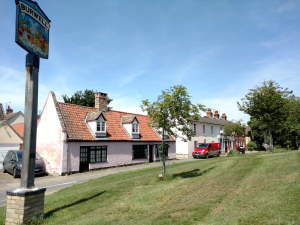
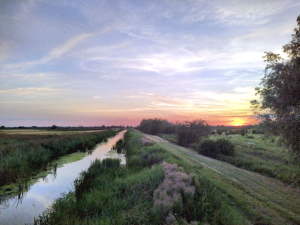
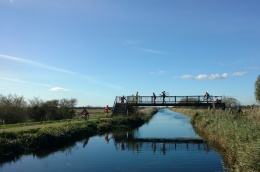
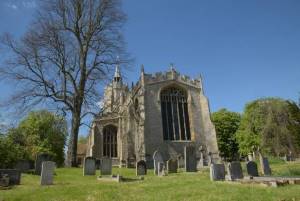
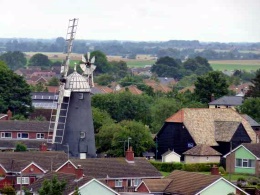
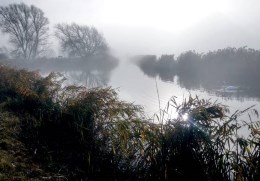
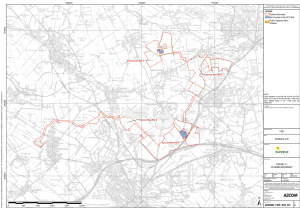
Latest Proposals
Project and
Current Status
(350 new homes)
Linden Homes
Web Site
Planning Docs
This Land -
Councillors
Express Concerns
This Land -
Council plays down
fears over loan
This Land Business Plan?
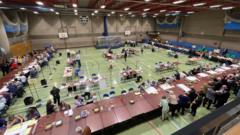 Council wants to go ahead with elections
Council wants to go ahead with electionsHuntingdonshire District Council says it is important to "maintain democratic accountability".
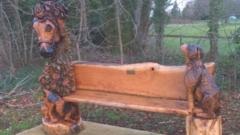 Villagers' shock at theft of sculpted animal bench
Villagers' shock at theft of sculpted animal benchThe "beloved" work of art featuring a horse's head and two dogs sat in the centre of the village.
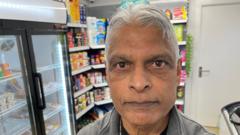 New community shop a 'fantastic asset' for village
New community shop a 'fantastic asset' for villageA new shop opens in the car park of an Indian restaurant, partly funded and staffed by villagers.
 Heavy rain warning issued for East of England
Heavy rain warning issued for East of EnglandThere is a risk of flooding and travel disruption, says the Met Office.
 Passengers fell out of seats on speeding train
Passengers fell out of seats on speeding trainThe service went through a junction in Hitchin at more than twice the speed limit.
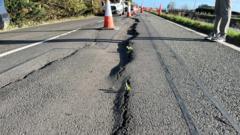 County's road repair backlog bill stands at £800m
County's road repair backlog bill stands at £800mMore than half of the total figure is needed to fix "soil-affected" roads, a council claims.
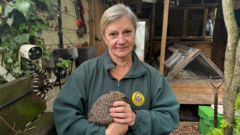 Founder left 'numb' after wildlife centre is refused
Founder left 'numb' after wildlife centre is refusedSue Stubley says she is "gutted" after £2m plans for the Long Acre Wildlife Hospital are refused.
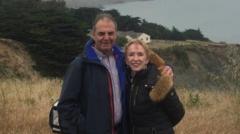 Hospital charity gets record-breaking £435k gift
Hospital charity gets record-breaking £435k giftWendy J. Tomlin-Hess says it is a "thank you" to the Royal Papworth for saving her brother's life.
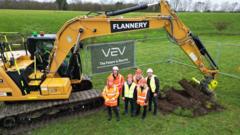 Work starts on solar park to power bin lorries
Work starts on solar park to power bin lorriesThe councils behind the project say it will include 36 electric vehicle charging points.
 Families pay tribute to women who died after crash
Families pay tribute to women who died after crashCheryl Pierre will be remembered for "grace and strength", Letitia Cuney is described as a "legend".
 Cambridge United sign up to abuse reporting app
Cambridge United sign up to abuse reporting appFormer England striker Emile Heskey says he does not want abuse at football to be normalised.










